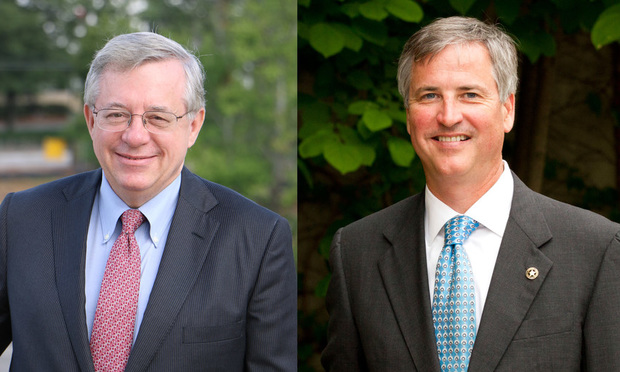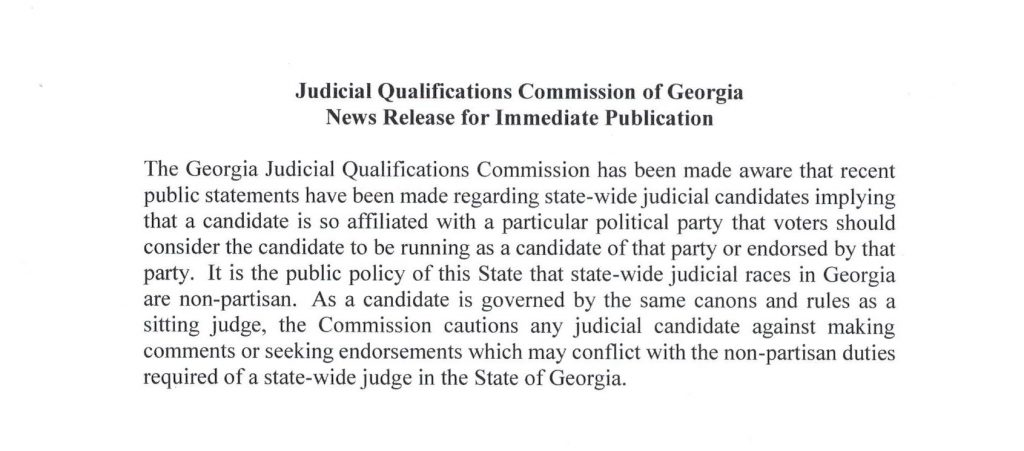State Judicial Watchdog Issues Warning in State Appeals Court Race
State Appeals Court candidate Ken Shigley has drawn the attention of the JQC for a press release touting his conservative Republican support while targeting his opponent "a lifelong Democrat" in what's supposed to be a nonpartisan race.
May 04, 2018 at 05:17 PM
5 minute read

Georgia's judicial watchdog agency issued a directive Friday chiding state Court of Appeals candidates against making partisan comments or seeking endorsements that might conflict with a judge's nonpartisan duties.
The Judicial Qualifications Commission said it issued the warning because it was made aware of recent statements involving a judicial candidate implying that another candidate “is so affiliated with a particular political party that voters should consider the candidate to be running as a candidate of that party or endorse that party.”

While the commission news release did not identify the race or candidate, JQC executive director Ben Easterlin confirmed it was in response to the race between Ken Shigley and Ken Hodges.
On Tuesday, Shigley issued a news release promoting endorsements from Republicans, and portrayed Hodges as “a lifelong Democrat.”
Shigley's release—distributed by political consultant Brian Robinson, a former spokesman and adviser to Republican Gov. Nathan Deal—included praise from Newt Gingrich, the former Republican speaker of the House of Representatives. It also included a statement from Georgia GOP Chairwoman Sue Everhart, who said voters deserved to know that Hodges—who has garnered bipartisan support in the current race—had previously run for office as a Democrat. Hodges was elected three times as Dougherty County's district attorney on the Democratic ticket. He ran unsuccessfully as a Democrat for state attorney general in 2010.
In Robinson's release, Shigley also promised to uphold “conservative values.”
Judicial races in Georgia are nonpartisan, and candidates for judicial posts as well as judges are governed by the state Canon of Judicial Ethics.
“As a candidate is governed by the same canons and rules as a sitting judge, the commission cautions any judicial candidate against making comments or seeking endorsements which may conflict with the nonpartisan duties required of a statewide judge in the state of Georgia,” the JQC statement said.
On Friday, Hodges said, “I think it's appropriate for the JQC to weigh in. It's alarming that a candidate would not take the canons more seriously.”
“My opponent,” he added, “is desperately bringing his political agenda to the bench, the one place politics simply don't belong.”
Shigley was unaware of the JQC statement until the Daily Report read it to him while he was traveling. Shigley said he began his campaign “in an entirely nonpartisan manner.” But when he appeared at campaign forums with Hodges, Shigley said, Hodges would list a slate of Republicans who endorsed his candidacy.
“It made him sound like a lifelong Republican,” Shigley said. ”I just pointed out he was a Democratic candidate for attorney general.”
Shigley said that Hodges' Republican endorsements prompted his campaign manager to tell him, “We have to punch back with some endorsements of our own. And we got a couple of them.”
Shigley said that he would review Robinson's news release and his supporters' statements “and see if some revision might be appropriate.”
Shigley said Robinson's release was forwarded to him. “I did not sit down and analyze it,” he added.
Asked if he approved the release, he said, “I didn't disapprove it.” But, he added, “Maybe I should have read it a little more closely. At first glance, it was basically announcing we had a couple of endorsements by folks comparable to those Hodges had put out.”
Easterlin described the commission statement as “cautionary.” He said it did not stem from any official complaint, and should be considered proactive on the agency's part. Easterlin said the Daily Report's story on Shigley's release is what brought the matter to its attention.”
Nonpartisan judicial elections are a reflection of a judge's role as a neutral party who won't pursue an agenda associated with a political party, and who will make rulings “consistent with the law and the evidence,” Easterlin added.
“A judicial candidate that points to a partisan association is effectively accusing the other judicial candidate of bias,” Easterlin said. “Likewise, a judicial candidate who clothes himself or herself in the tenets of partisanship is promoting an election based on a partisan agenda.”
Hodges and Shigley are running for an opening created by the departure of Judge John Ellington, who is running unopposed for the Georgia Supreme Court to replace retiring Justice Carol Hunstein.
The judicial elections will be held May 22 but early voting is available in certain locations.
Read the JQC Memo below:

This content has been archived. It is available through our partners, LexisNexis® and Bloomberg Law.
To view this content, please continue to their sites.
Not a Lexis Subscriber?
Subscribe Now
Not a Bloomberg Law Subscriber?
Subscribe Now
NOT FOR REPRINT
© 2025 ALM Global, LLC, All Rights Reserved. Request academic re-use from www.copyright.com. All other uses, submit a request to [email protected]. For more information visit Asset & Logo Licensing.
You Might Like
View All
On The Move: Energy Infrastructure Pro Joins Moore & Van Allen, Adams & Reese Changes Atlanta Leadership
6 minute read
40% Contingency: A New Ruling Just Cost This Plaintiff Team $827K in Legal Fees
6 minute read

'David and Goliath' Dispute Between Software Developers Ends in $24M Settlement
Trending Stories
- 1'It's Not Going to Be Pretty': PayPal, Capital One Face Novel Class Actions Over 'Poaching' Commissions Owed Influencers
- 211th Circuit Rejects Trump's Emergency Request as DOJ Prepares to Release Special Counsel's Final Report
- 3Supreme Court Takes Up Challenge to ACA Task Force
- 4'Tragedy of Unspeakable Proportions:' Could Edison, DWP, Face Lawsuits Over LA Wildfires?
- 5Meta Pulls Plug on DEI Programs
Who Got The Work
Michael G. Bongiorno, Andrew Scott Dulberg and Elizabeth E. Driscoll from Wilmer Cutler Pickering Hale and Dorr have stepped in to represent Symbotic Inc., an A.I.-enabled technology platform that focuses on increasing supply chain efficiency, and other defendants in a pending shareholder derivative lawsuit. The case, filed Oct. 2 in Massachusetts District Court by the Brown Law Firm on behalf of Stephen Austen, accuses certain officers and directors of misleading investors in regard to Symbotic's potential for margin growth by failing to disclose that the company was not equipped to timely deploy its systems or manage expenses through project delays. The case, assigned to U.S. District Judge Nathaniel M. Gorton, is 1:24-cv-12522, Austen v. Cohen et al.
Who Got The Work
Edmund Polubinski and Marie Killmond of Davis Polk & Wardwell have entered appearances for data platform software development company MongoDB and other defendants in a pending shareholder derivative lawsuit. The action, filed Oct. 7 in New York Southern District Court by the Brown Law Firm, accuses the company's directors and/or officers of falsely expressing confidence in the company’s restructuring of its sales incentive plan and downplaying the severity of decreases in its upfront commitments. The case is 1:24-cv-07594, Roy v. Ittycheria et al.
Who Got The Work
Amy O. Bruchs and Kurt F. Ellison of Michael Best & Friedrich have entered appearances for Epic Systems Corp. in a pending employment discrimination lawsuit. The suit was filed Sept. 7 in Wisconsin Western District Court by Levine Eisberner LLC and Siri & Glimstad on behalf of a project manager who claims that he was wrongfully terminated after applying for a religious exemption to the defendant's COVID-19 vaccine mandate. The case, assigned to U.S. Magistrate Judge Anita Marie Boor, is 3:24-cv-00630, Secker, Nathan v. Epic Systems Corporation.
Who Got The Work
David X. Sullivan, Thomas J. Finn and Gregory A. Hall from McCarter & English have entered appearances for Sunrun Installation Services in a pending civil rights lawsuit. The complaint was filed Sept. 4 in Connecticut District Court by attorney Robert M. Berke on behalf of former employee George Edward Steins, who was arrested and charged with employing an unregistered home improvement salesperson. The complaint alleges that had Sunrun informed the Connecticut Department of Consumer Protection that the plaintiff's employment had ended in 2017 and that he no longer held Sunrun's home improvement contractor license, he would not have been hit with charges, which were dismissed in May 2024. The case, assigned to U.S. District Judge Jeffrey A. Meyer, is 3:24-cv-01423, Steins v. Sunrun, Inc. et al.
Who Got The Work
Greenberg Traurig shareholder Joshua L. Raskin has entered an appearance for boohoo.com UK Ltd. in a pending patent infringement lawsuit. The suit, filed Sept. 3 in Texas Eastern District Court by Rozier Hardt McDonough on behalf of Alto Dynamics, asserts five patents related to an online shopping platform. The case, assigned to U.S. District Judge Rodney Gilstrap, is 2:24-cv-00719, Alto Dynamics, LLC v. boohoo.com UK Limited.
Featured Firms
Law Offices of Gary Martin Hays & Associates, P.C.
(470) 294-1674
Law Offices of Mark E. Salomone
(857) 444-6468
Smith & Hassler
(713) 739-1250






